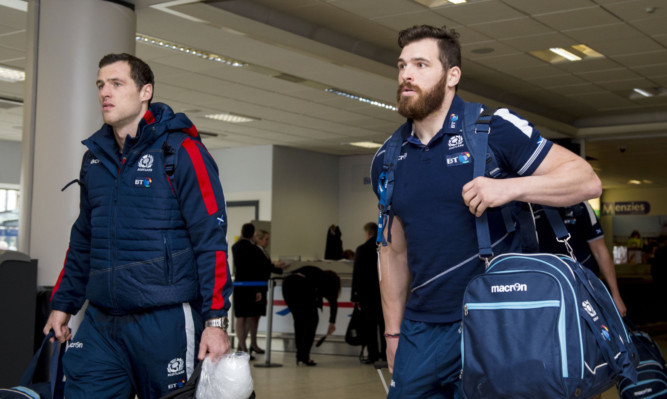Tim Visser’s strike ratio of ten tries in 23 tests and more to the point, three in two tests against Italy means the wing is the only change in Scotland’s starting XV for tomorrow’s knife-edge match in the Stadio Olimpico.
The Flying Dutchman Visser comes in for Sean Lamont for his first cap since a scoring appearance in the Rugby World Cup, in the pool game against the USA. A hamstring tear cost him involvement in the first two games of the championship, but he’s played two full 80 minutes for Harlequins since and his scoring prowess has continued largely unabated since he moved to the London club from Edinburgh in the summer.
He bagged a brace of tries in the last meeting of the teams as did Lamont in the 48-7 rout in the World Cup warm-up game at BT Murrayfield in August. Visser also scored in the 34-10 win in 2013, also at Murrayfield, but has never played in Rome.
He’s acutely aware that this match is absolutely pivotal for the Scots.
“It’s so important we come back from Rome with a win,” he said. “For us, this is make or break for the Six Nations.
“This is the game where we can put ourselves in a good position to move forward, but we’re not looking further than the weekend, obviously. Italy are a strong side at home and we’ve got to go over there and get a good win.”
Visser had limited involvement during the World Cup, but is at a loss to explain why the feel-good factor and momentum from the quarter-final near miss against Australia hasn’t been built on.
“It’s hard to say,” the continued. “We’ve missed out on crucial points at crucial stages of games. That’s how you lose.
“Looking back at the Wales match, if Hoggy [full-back Stuart Hogg] hadn’t gone off injured or we had sneaked another try in that crucial period just before they scored their second, that might have made the difference in the last 20 minutes.
“If we can score crucial points at important times this weekend, then yeah, we can win. If we can play to our capabilities like we did at the World Cup then we should get a win. But it all depends on ourselves really.”
For himself, escaping Edinburgh’s conservative style where he saw little ball over the last couple of seasons has proved a good move, with six tries in 10 games for `Quins.
“The plan is now to try and claim a regular starting berth for Scotland,” he added. “I’ve had a good period with Quins and now I need to bring that back home to the international stage.
“I feel the move is certainly bringing out the best rugby of my career. I’ve gone back to how I used to play with Edinburgh back in the day.
“We play a very expansive type of rugby with Quins. I get a lot of ball so I’ve been able to pick the fruits of that. The form was always there, it just needed the chance to come out.”
Cotter, yet to win a Six Nations game in seven tries, knows that scrutiny will intensify if the Scots run up a tenth successive loss in the championship, but sought to play down that pressure.
“The boys are desperate for a win,” he admitted, before quickly adding, “If we don’t get it next week then we must certainly strive for it in the next game.
“This team will win at some stage because there is that determination within. They are proud players.
“If we tick our boxes around the contact area, get the scrum and line-out working well and defend when we need to defend then we have shown we can be dangerous once we get our hands on the ball.”
Cotter has also shaken up his bench with a four changes largely expected in the 24 hours between Glasgow’s team being announced to play Dragons last night.
The only remaining surprise was Matt Scott, thought to have been one of Scotland’s better performers against England before pulling up with injury two days before the Welsh game. He wasn’t expected to get his starting place back after Duncan Taylor’s excellent performance in Cardiff, but it’s harsh on him being omitted altogether.
Both replacement props have been changed. Rory Sutherland is uncapped but has had a great season backing up Alasdair Dickinson at Edinburgh. On the tighthead Moray Low hasn’t played for Scotland since 2014 and his last Six Nations game was the 2014 match in Rome when he started but struggled so badly in the scrum he was lifted with two minutes still to go before half-time.
Wilson, who also played in the 2014 win, is preferred to Strauss and the coaches clearly like his abrasiveness and his versatility he can play 6, 7 or 8 but it still seems odd he’s been preferred to Strauss, who would be a real impact player off the bench on the kind of hard and fast pitch he favours.
Peter Horne was an obvious choice to return to the squad once fit, particularly after he had another influential outing for Glasgow last week against Munster. Often wholly wrongly identified as causing the loss to Italy last year with a late missed touchfinder, he’s proved an impact replacement before with his intelligent distribution and support running.
Team: S Hogg (Glasgow); T Seymour (Glasgow), M Bennett (Glasgow), D Taylor (Saracens), T Visser (Harlequins); F Russell (Glasgow), G Laidlaw (Gloucester, capt); A Dickinson (Edinburgh), R Ford (Edinburgh), WP Nel (Edinburgh), R Gray (Toulouse), J Gray (Glasgow), J Barclay (Scarlets), J Hardie (Edinburgh), D Denton (Bath).
Replacements: S McInally (Edinburgh), R Sutherland (Edinburgh), M Low (Exeter), T Swinson (Glasgow), R Wilson (Glasgow), S Hidalgo-Clyne (Edinburgh), P Horne (Glasgow), S Lamont (Glasgow).
